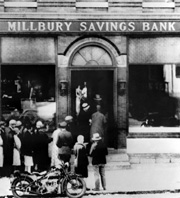The Economy at the End of the Year
John Moe
Angela Kim
DECEMBER 27, 2008
- October 1929
- (OFF/AFP/Getty Images)
Web Resources
Related Stories
- Good News, Bad News, No News
- Spending the Stimulus Money
- Foreclosure Double Punch
- The End of Weekend America
More From John Moe
- Now you can draw state redistricting maps too
- The coming conundrum of home DNA testing
- What mattered this year in technology
More From Angela Kim
This year the dreaded R word was dropped. We're in the thick of a recession. It was in the air and we might have been in denial but now we know it's here. Some popular themes to come out of this year had to do with Bear Stearns, Lehman Brothers, and bailouts. This was the year that Americans had to come to grips with their spending and debt and boy, it was not a pretty sight. Chris Farrell, American Public Media's chief economic correspondent, is here to sift through the economic news of 2008.
---
John Moe: How did things snowball and get so crazy so quickly over the course of this fall heading into winter?
Chris Farrell: The moment is the failure of Lehman Brothers.
Moe: September?
Farrell: September. Remember that in March we had engineered a rescue and eventually the failure of Bear Stearns, the legendary investment bank. So that disappeared.
Moe: It was a storm cloud.
Farrell: It was a storm cloud. But then we knew Lehman Brothers was in trouble and the sense was - and I shared this - everybody knows Lehman's in trouble, so we can't have the government bailing out everybody. We can't have this. This isn't the American way.
Moe: That's not the way capitalism works.
Farrell: No. Lehman failed and what it turned out is "Oh my God!" That was the reaction of the global capital market, and the next thing that you know the global capital market ceased up and that's when we started talking about the greatest financial crisis since the Great Depression.
Moe: Is that approach to thinking about it, by holding it up next to the Great Depression, making the problem worse or changing the problem some way?
Farrell: Part of me says you're absolutely right. There's this bizarre aspect, I don't know if you've been following it, of "We're refighting the New Deal." Was the New Deal good? Was the New Deal bad? We've taken two lessons from the 1930s. One is on the fiscal side: borrow. You don't worry about the budget deficit. You just don't worry about it. On the monetary side, you do whatever you have to do to keep the system operating. So my sense is that's where the optimism should come from - that on the fiscal and monetary side of the equation, whether it's the US government, we go to Europe. We go to China. Everybody is operating under the same playbook. Let's not allow this recession to become a Great Depression. So what we really need to have are corporations, CEOs to say: "Hey, it's going to be better tomorrow. It's going to be better so I'm going to start investing. I'm not going to invest in a plant. I'm going to buy some high-tech equipment. I'm going to invest to grow." And if businesses invest to grow and they start hiring people and we start making more wages, we'll spend a little bit.
Moe: Isn't that just as speculative as the trust in credit that got us into this mess in the first place?
Farrell: Well, the whole system works on trust. The whole system works on optimism. Joseph Schumpeter, everyone loves Joseph Schumpeter because of his expression "creative destruction." He was the economist that came up with that phrase. Anyhow, he had this really profound statement. He said when times are dark, wisdom is saying things are going to get worse, because there's a part of us that believes that. Part of us says that's a really convincing case.
Moe: Because things have been getting worse up to this point.
Farrell: Things have been getting worse up to this point. And you're absolutely right. The optimists have been wrong and the pessimists have been right. But there comes a turning point where the gurus of darkness turn out to be wrong because they keep singing the same song and the gurus of the sun also rises turn out to be right. You know, Trader Joe's came out of the '73 to '74 recession. BusinessWeek's first issue was published in September 1929, how's that for timing? In the end the optimism does reemerge. There are new opportunities that are there. What the government is trying to do right now is get enough money and support into the system to give a realistic basis for that optimism.







Comments
Comment | Refresh
Post a Comment: Please be civil, brief and relevant.
Email addresses are never displayed, but they are required to confirm your comments. All comments are moderated. Weekend America reserves the right to edit any comments on this site and to read them on the air if they are extra-interesting. Please read the Comment Guidelines before posting.
You must be 13 or over to submit information to American Public Media. The information entered into this form will not be used to send unsolicited email and will not be sold to a third party. For more information see Terms and Conditions and Privacy Policy.